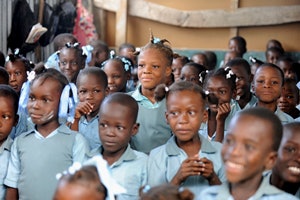
In the days and weeks following the earthquake on January 12, 2010, images of death and destruction were broadcast around the world. Many people — from celebrities to journalists — stepped forward to offer explanations of how such an event could take place. Many of the articles and interviews presented negative portraits of Haiti, some even blaming its people and Vodou practices for allowing such devastation to occur.
“The media has long reinforced the idea of Haiti as a failed state, a country where poor governance, corruption, poverty and violence are all found in excess,” says Dr. Claudine Michel, a professor of Black studies at the University of California, Santa Barbara and editor of The Journal of Haitian Studies. “The country’s national religion is continuously maligned and the populace blamed for centuries of colonial and neo-colonial projects. These depictions intensified after the quake.
“The role of serious scholars of Haiti is to not only dispel myths and misrepresentations but to offer ‘new narratives’ that correct analyses and restore historical records and the people themselves,” she adds. “We have seen a number of powerful Haitian and non-Haitian voices emerge in the U.S. landscape.”
What has developed over the past five years is a slow and steady increase among undergraduate and graduate students interested in studying Haiti. There is a sense of urgency — a word used by several experts — among scholars with ties to Haiti and long-held academic interest to research, write about and teach the subject.
“The moment we have folks paying attention, you want for there to not be one story about Haiti, but for there to be multiple,” says Dr. Manoucheka Celeste, an assistant professor of comparative ethnic studies at the University of Nevada, Las Vegas. “It makes the work feel like it’s urgent and it’s constantly needing to be a part of everyday conversations we have.”
Celeste’s work centers on media representations. She notes that the world often understands Haiti through dominant frameworks of poverty and race.















